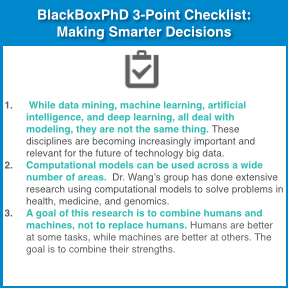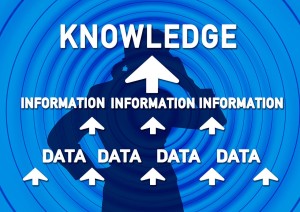
Does t he Field of Big Data Mean that Machines will Replace Humans?
he Field of Big Data Mean that Machines will Replace Humans?
Companies, government, and nonprofits are spending a lot of time and money on the promise that big data can solve big problems. They’re looking to people like Dr. Wei Wang to help them. Wei is a Professor of Computer Science at UCLA and faculty in our UC Institute for Prediction Technology. She’s an expert in data mining and big data. In this week’s interview, she’ll tell you what she’s working on and the recent trends in how computer science methods can address real-world problems.
Hi Wei, can you tell us your background and about some of your current work?
My research has focused on big data analytics, bridging the areas of data mining, databases, and their applications to other disciplines. The overarching goal of my research is to achieve efficient and effective knowledge discovery on large and complex databases, and to deploy in applications with significant social impacts such as medicine, social media and networks.
When people talk about computer science and big data, we hear words thrown around like ‘data mining,’ ‘machine learning,’ ‘artificial intelligence,’ and more recently, ‘deep learning.’ Do you work in  all of these areas? What are the differences between them?
all of these areas? What are the differences between them?
Machine learning focuses on inventing new computational models for capturing patterns in data, whereas data mining focuses on addressing the scalability issue, making a model computable on big data. Artificial intelligence originated from building mathematical models to mimic human reasoning process. Deep learning refers to modeling and inferencing with multi-layer graphical models.
What are some ways your research can be applied to solving real-world problems? For example, in business, or in public sectors areas like public health?
Our research has wide applications. To name a few, we have built computational models to monitor patients with chronic diseases, to identify disease related biomarkers, to screen chemical compounds for new drug design, to analyze social media for behavior modeling and event detection.
What are some of the challenges that need to be addressed in your field? And are they able to be addressed?
There are many challenges we are tackling. The data are “big” but the space of all potential patterns is much bigger. This requires us to investigate properties held by the pattern space to guide the pattern discovery process.
 Are computer scientists trying to get machines to “think” like humans or be smarter than humans? Is that the goal of data mining, and do you think that is possible?
Are computer scientists trying to get machines to “think” like humans or be smarter than humans? Is that the goal of data mining, and do you think that is possible?
There are some tasks that humans are far better than machines and some tasks that machines perform better than humans. What we aim for is to combine their strength, rather than having machines replace humans.

Pingback: 123movies
Pingback: GVK Biosciences
Pingback: DMPK
Pingback: Festivales
Pingback: scr888 login
Pingback: Corporate Events in Hyderabad
Pingback: dokter kandungan di jakarta
Pingback: iraqi law111
Pingback: كلية العلوم الانسانية
Pingback: Aws Alkhazraji Diyala
Pingback: Computational Chemist FTE
Pingback: house for sale
Pingback: GVK BIO Latest News
Pingback: guaranteedppc.com
Pingback: traditional wedding planners
Pingback: Mr. Checkout Distributors
Pingback: Innovation Tree SEO agency
Pingback: seo salt lake city
Pingback: CPNS 2018 Kota Bandar Lampung
Pingback: Berufsbekleidung
Pingback: warehouse for sale
Pingback: tutorial
Pingback: Ambika Ahuja Jaipur Escorts
Pingback: XXX JAIPUR ESCORTS ALIYA SINHA
Pingback: XXX JAIPUR ESCORTS MODEL DRISHYA
Pingback: Heena Khan Bangalore Escorts
Pingback: Jiya Malik High Profile Jaipur Escorts Model
Pingback: XXX FUN WITH JAIPUR ESCORTS PUJA KAUR
Pingback: XXX BANGALORE ESCORTS ROZLYN MODEL
Pingback: Selly Arora Independent Bangalore Escorts
Pingback: Enjoy With Jaipur Escorts Tanisha Walia
Pingback: Bristy Roy Independent Bangalore Escorts
Pingback: Bangalore Escorts Sneha Despandey
Pingback: Caco-2 Permeability studies
Pingback: sciences diyala
Pingback: free forex signals
Pingback: Driver
Pingback: CYP phenotyping
Pingback: animales
Pingback: boutique en ligne
Pingback: Ruby Sen Kolkata Independent Escorts
Pingback: Diana Diaz Goa Independent Escorts Services
Pingback: Diksha Arya Independent Escorts Services in Kolkata
Pingback: Devika Kakkar Goa Escorts Services
Pingback: Rebecca Desuza Goa Independent Escorts Services
Pingback: Yamini Mittal Independent Escorts Services in Goa
Pingback: Simmi Mittal Kolkata Escorts Services
Pingback: Kolkata Escorts Services Ragini Mehta
Pingback: Navya Sharma Independent Kolkata Escorts Services
Pingback: Elisha Roy Goa Independent Escorts Services
Pingback: Alisha Oberoi Kolkata Escorts Services
Pingback: Divya Arora Goa Independent Escorts Services
Pingback: Simran Batra Independent Escorts in Kolkata
Pingback: Ashna Ahuja Escorts Services in Kolkata
Pingback: Sofia Desai Escorts Services in Goa
Pingback: Goa Escorts Services Drishti Goyal
Pingback: Mayra Khan Escorts Services in Kolkata
Pingback: best bitcoin slots
Pingback: Sruthi Pathak Escorts in Bangalore
Pingback: Ambika Ahuja Jaipur Escorts Services
Pingback: freshamateurs18
Pingback: comment80
Pingback: comment140
Pingback: comment257
Pingback: comment580
Pingback: comment492
Pingback: comment295
Pingback: comment701
Pingback: comment930
Pingback: comment801
Pingback: comment849
Pingback: comment668
Pingback: comment290
Pingback: comment348
Pingback: comment413
Pingback: comment487
Pingback: comment179
Pingback: comment737
Pingback: comment875
Pingback: comment456
Pingback: comment777
Pingback: comment530
Pingback: comment218
Pingback: comment792
Pingback: comment36
Pingback: comment744
Pingback: comment831
Pingback: comment174
Pingback: comment71
Pingback: comment103
Pingback: comment845
Pingback: Sruthi Pathak Bangalore Female Escorts
Pingback: new siriustube633 abdu23na3137 abdu23na21
Pingback: latestvideo sirius551 abdu23na1411 abdu23na39
Pingback: hd videos tubepla.net22 afeu23na9443 abdu23na17
Pingback: Sruthi Pathak Bangalore Escorts Services
Pingback: Trully Independent Bangalore Escorts Services
Pingback: Trully Independent Bangalore Escorts
Pingback: Fiza Khan Kolkata Independent Call Girls Services
Pingback: Ruchika Roy Kolkata Escorts Call Girls Services
Pingback: 2019
Pingback: cleantalkorg2.ru
Pingback: #macron #Lassalle
Pingback: a2019-2020
Pingback: facebook
Pingback: facebook1
Pingback: javsearch.mobi
Pingback: Fiza Khan Kolkata Independent Escorts Call Girls Services
Pingback: Fiza Khan Kolkata Call Girls Escorts Services
Pingback: Diksha Arya Kolkata Escorts Call Girls Services
Pingback: Diksha Arya Kolkata Independent Escorts Call Girls Services
Pingback: VoirFilms
Pingback: Cheap
Pingback: Nidika Offer Call Girls in Bangalore
Pingback: Hyderabad Escorts Call Girls Services
Pingback: Pune Escorts Services Call Girls
Pingback: Bangalore Cheap Escorts Sevices
Pingback: Goa Escorts Call Girls Services
Pingback: Bangalore Escorts Services